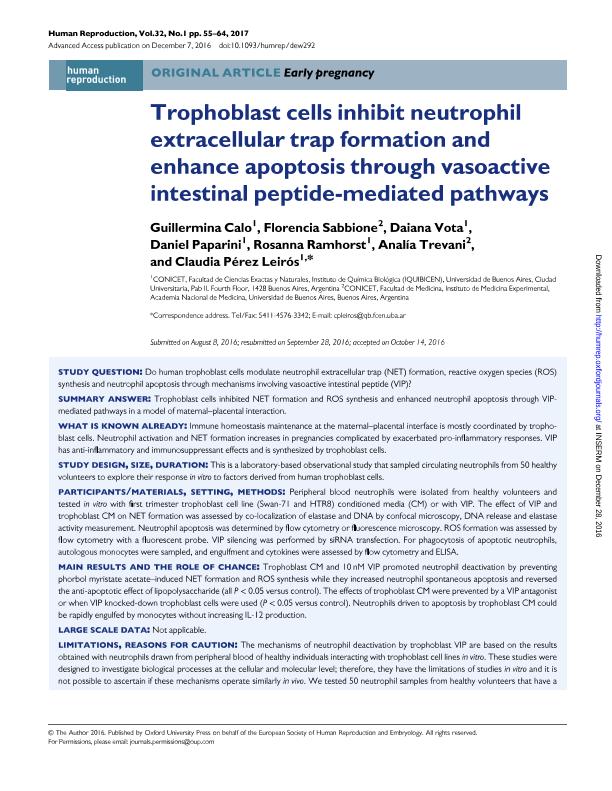Mostrar el registro sencillo del ítem
dc.contributor.author
Calo, Guillermina

dc.contributor.author
Sabbione, Florencia

dc.contributor.author
Vota, Daiana Marina

dc.contributor.author
Paparini, Daniel Esteban

dc.contributor.author
Ramhorst, Rosanna Elizabeth

dc.contributor.author
Trevani, Analía Silvina

dc.contributor.author
Perez Leiros, Claudia

dc.date.available
2018-04-03T22:03:53Z
dc.date.issued
2016-12
dc.identifier.citation
Calo, Guillermina; Sabbione, Florencia; Vota, Daiana Marina; Paparini, Daniel Esteban; Ramhorst, Rosanna Elizabeth; et al.; Trophoblast cells inhibit neutrophil extracellular trap formation and enhance apoptosis through vasoactive intestinal peptide-mediated pathways; Oxford University Press; Human Reproduction; 32; 12-2016; 55-64
dc.identifier.issn
0268-1161
dc.identifier.uri
http://hdl.handle.net/11336/40618
dc.description.abstract
STUDY QUESTION:Do human trophoblast cells modulate neutrophil extracellular trap (NET) formation, reactive oxygen species (ROS) synthesis and neutrophil apoptosis through mechanisms involving vasoactive intestinal peptide (VIP)?SUMMARY ANSWER:Trophoblast cells inhibited NET formation and ROS synthesis and enhanced neutrophil apoptosis through VIP-mediated pathways in a model of maternal-placental interaction.WHAT IS KNOWN ALREADY:Immune homeostasis maintenance at the maternal-placental interface is mostly coordinated by trophoblast cells. Neutrophil activation and NET formation increases in pregnancies complicated by exacerbated pro-inflammatory responses. VIP has anti-inflammatory and immunosuppressant effects and is synthesized by trophoblast cells.STUDY DESIGN, SIZE, DURATION:This is a laboratory-based observational study that sampled circulating neutrophils from 50 healthy volunteers to explore their response in vitro to factors derived from human trophoblast cells.PARTICIPANTS/MATERIALS, SETTING, METHODS:Peripheral blood neutrophils were isolated from healthy volunteers and tested in vitro with first trimester trophoblast cell line (Swan-71 and HTR8) conditioned media (CM) or with VIP. The effect of VIP and trophoblast CM on NET formation was assessed by co-localization of elastase and DNA by confocal microscopy, DNA release and elastase activity measurement. Neutrophil apoptosis was determined by flow cytometry or fluorescence microscopy. ROS formation was assessed by flow cytometry with a fluorescent probe. VIP silencing was performed by siRNA transfection. For phagocytosis of apoptotic neutrophils, autologous monocytes were sampled, and engulfment and cytokines were assessed by flow cytometry and ELISA.MAIN RESULTS AND THE ROLE OF CHANCE:Trophoblast CM and 10 nM VIP promoted neutrophil deactivation by preventing phorbol myristate acetate-induced NET formation and ROS synthesis while they increased neutrophil spontaneous apoptosis and reversed the anti-apoptotic effect of lipopolysaccharide (all P < 0.05 versus control). The effects of trophoblast CM were prevented by a VIP antagonist or when VIP knocked-down trophoblast cells were used (P < 0.05 versus control). Neutrophils driven to apoptosis by trophoblast CM could be rapidly engulfed by monocytes without increasing IL-12 production.LARGE SCALE DATA:Not applicable.LIMITATIONS, REASONS FOR CAUTION:The mechanisms of neutrophil deactivation by trophoblast VIP are based on the results obtained with neutrophils drawn from peripheral blood of healthy individuals interacting with trophoblast cell lines in vitro. These studies were designed to investigate biological processes at the cellular and molecular level; therefore, they have the limitations of studies in vitro and it is not possible to ascertain if these mechanisms operate similarly in vivo. We tested 50 neutrophil samples from healthy volunteers that have a normal variability in their responses. Cell lines derived from human trophoblast were used, and we cannot rule out a differential behavior of trophoblast cells in contact with neutrophils in vivo.WIDER IMPLICATIONS OF THE FINDINGS:Results presented here are consistent with an active mechanism through which neutrophils in contact with trophoblast cells would be deactivated and silently cleared by decidual macrophages throughout pregnancy. They support a novel immunomodulatory role of trophoblast VIP on neutrophils at the placenta, providing new clues for pharmacological targeting of immune and trophoblast cells in pregnancy complications associated with exacerbated inflammation.
dc.format
application/pdf
dc.language.iso
eng
dc.publisher
Oxford University Press

dc.rights
info:eu-repo/semantics/openAccess
dc.rights.uri
https://creativecommons.org/licenses/by-nc-sa/2.5/ar/
dc.subject
Trophoblast Cells
dc.subject
Neutrophil Extracellular Trap
dc.subject
Vasoactive Intestinal Peptide
dc.subject.classification
Otras Medicina Básica

dc.subject.classification
Medicina Básica

dc.subject.classification
CIENCIAS MÉDICAS Y DE LA SALUD

dc.title
Trophoblast cells inhibit neutrophil extracellular trap formation and enhance apoptosis through vasoactive intestinal peptide-mediated pathways
dc.type
info:eu-repo/semantics/article
dc.type
info:ar-repo/semantics/artículo
dc.type
info:eu-repo/semantics/publishedVersion
dc.date.updated
2018-04-03T18:26:21Z
dc.journal.volume
32
dc.journal.pagination
55-64
dc.journal.pais
Reino Unido

dc.journal.ciudad
Oxford
dc.description.fil
Fil: Calo, Guillermina. Consejo Nacional de Investigaciones Científicas y Técnicas. Oficina de Coordinación Administrativa Ciudad Universitaria. Instituto de Química Biológica de la Facultad de Ciencias Exactas y Naturales. Universidad de Buenos Aires. Facultad de Ciencias Exactas y Naturales. Instituto de Química Biológica de la Facultad de Ciencias Exactas y Naturales; Argentina
dc.description.fil
Fil: Sabbione, Florencia. Consejo Nacional de Investigaciones Científicas y Técnicas. Instituto de Medicina Experimental. Academia Nacional de Medicina de Buenos Aires. Instituto de Medicina Experimental; Argentina
dc.description.fil
Fil: Vota, Daiana Marina. Consejo Nacional de Investigaciones Científicas y Técnicas. Oficina de Coordinación Administrativa Ciudad Universitaria. Instituto de Química Biológica de la Facultad de Ciencias Exactas y Naturales. Universidad de Buenos Aires. Facultad de Ciencias Exactas y Naturales. Instituto de Química Biológica de la Facultad de Ciencias Exactas y Naturales; Argentina
dc.description.fil
Fil: Paparini, Daniel Esteban. Consejo Nacional de Investigaciones Científicas y Técnicas. Oficina de Coordinación Administrativa Ciudad Universitaria. Instituto de Química Biológica de la Facultad de Ciencias Exactas y Naturales. Universidad de Buenos Aires. Facultad de Ciencias Exactas y Naturales. Instituto de Química Biológica de la Facultad de Ciencias Exactas y Naturales; Argentina
dc.description.fil
Fil: Ramhorst, Rosanna Elizabeth. Consejo Nacional de Investigaciones Científicas y Técnicas. Oficina de Coordinación Administrativa Ciudad Universitaria. Instituto de Química Biológica de la Facultad de Ciencias Exactas y Naturales. Universidad de Buenos Aires. Facultad de Ciencias Exactas y Naturales. Instituto de Química Biológica de la Facultad de Ciencias Exactas y Naturales; Argentina
dc.description.fil
Fil: Trevani, Analía Silvina. Consejo Nacional de Investigaciones Científicas y Técnicas. Instituto de Medicina Experimental. Academia Nacional de Medicina de Buenos Aires. Instituto de Medicina Experimental; Argentina
dc.description.fil
Fil: Perez Leiros, Claudia. Consejo Nacional de Investigaciones Científicas y Técnicas. Oficina de Coordinación Administrativa Ciudad Universitaria. Instituto de Química Biológica de la Facultad de Ciencias Exactas y Naturales. Universidad de Buenos Aires. Facultad de Ciencias Exactas y Naturales. Instituto de Química Biológica de la Facultad de Ciencias Exactas y Naturales; Argentina
dc.journal.title
Human Reproduction

dc.relation.alternativeid
info:eu-repo/semantics/altIdentifier/doi/http://dx.doi.org/10.1093/humrep/dew292
dc.relation.alternativeid
info:eu-repo/semantics/altIdentifier/url/https://academic.oup.com/humrep/article/32/1/55/2649131
Archivos asociados
